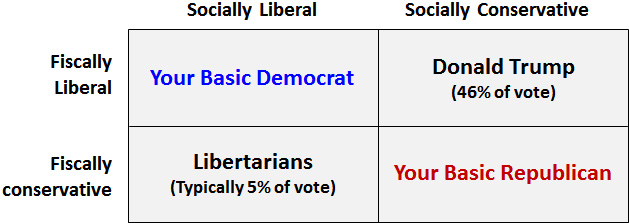Dave Weigel recaps all the currents that flowed around the Ellison-Perez contest for DNC chair, and covers most of the bases very nicely. One of those bases, of course, is that Ellison was the Bernie guy and Perez was the Hillary guy. Josh Marshall comments:
The Democratic party will have a hard time moving forward if every contest must be reduced and simplified into a replay of the 2016 primary battle.
That’s true, but you know what? It’s only been a few months since the election. These things take time. All things considered, Democrats are in surprisingly fine fettle considering just how thoroughly they’ve been tromped over the past few years and how little time has passed since Donald Trump won. A few high-profile lefties have been complaining about Keith Ellison’s loss and how it proves the Democratic Party is a pawn of Wall Street etc. etc., but the emphasis here should be on “few.” And those few are mostly people who had no patience for mainstream liberalism anyway. All things considered, there’s been very little blowback from Tom Perez’s win. Nearly everybody seems pretty anxious to move on and win some elections.
One other point while I’m on the subject. Marshall also says this:
I think most Democrats realize or believe that the politics of the Obama era will not be the politics that is necessary in the post-Obama era. But probing beneath that general agreement is where things get more contentious. For many on the left of the party — and broadly speaking, the Sanders wing of the party — this isn’t some evolutionary development or a general insufficiency of the Obama era. Obama’s incrementalist, cautious policy approach — deemed “neo-liberal” in its policy particulars — is what made Trumpism possible, they argue. So Obama-ism it is not just outdated or insufficient. It is the cause of the present crisis and must be specifically repudiated before the party can move forward.
For a long time, one of the favorite tropes of centrist columnists was that Republicans needed a candidate who was fiscally conservative but socially liberal. This was primarily because these columnists themselves were fiscally conservative but socially liberal. Someone,1 however, pointed out that exactly the opposite approach was more likely to succeed with actual voters: fiscally liberal but socially conservative. And roughly speaking, that’s how Trump campaigned.2 By adding a wall and an immigration ban to the normal conservative stew, he was, in effect, more socially conservative than even a guy like Ted Cruz. Fiscally, however, he was relatively liberal for a Republican. Sure, he yakked about the national debt, but he also promised not to touch Social Security or Medicare; he wanted to tear down Obamacare but was vocal about replacing it with something even better; he wanted a surge in Pentagon spending; he touted a huge infrastructure spending plan; and he promised tax cuts for all.

Roughly speaking, the fiscally conservative/socially liberal quadrant describes libertarians, who have spent decades trying to gather a following but haven’t succeeded anywhere in the world, as far as I know. It’s literally the only quadrant of this matrix that’s clearly a loser. Conversely, the basic Democrat and basic Republican quadrants have attracted plenty of followers. The only one that’s never really been tried recently is the Donald Trump quadrant.
But if it weren’t for the hammerlock of the two-party system, it’s long been viewed as a very plausible winning combination—and Trump just proved it could be. But he pulled this off by taking advantage of his rare ability to work around the traditional parties, not because of a backlash to the “neoliberalism” of the Obama era. White working-class voters have been fleeing the Democratic Party for decades, but not because Democrats were too stingy. It was because they were too friendly to gays, too prone to spending welfare money on blacks, and wanted to take their guns away. Donald Trump fixed all that.
POSTSCRIPT: When I say that the DNC race ended amicably, I mean that it was relatively small beer compared to lots of intra-Democratic battles of the past. On a scale of 1 to 10, I’d maybe give it a 3. However, I’m willing to change my mind if someone who’s been closer to these battles over the past few decades disagrees. How about Ed Kilgore? I’d trust his judgment on this.
1Sorry, I don’t remember who. It probably came from more than one person.
2Whether he governs that way remains to be seen.


















